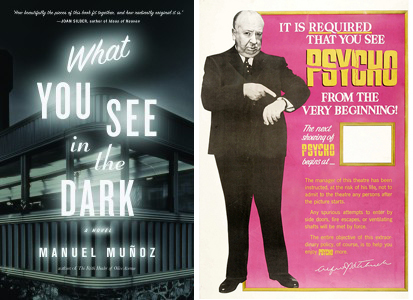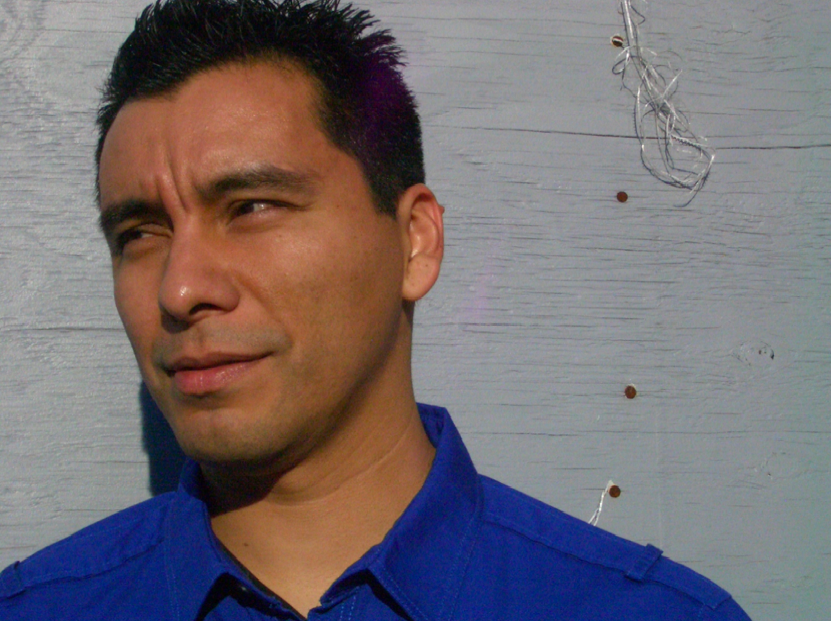Manuel Muñoz on Psycho, Nashville, and Movies as Inspiration
 Tuesday, March 29, 2011 at 8:30PM
Tuesday, March 29, 2011 at 8:30PM Interview
The Film Experience doesn't often push books upon you, but it's time for an exception. Manuel Muñoz's debut novel "What You See in the Dark" hits bookstores, virtual and otherwise, this week. While it is a work of fiction, it borrows from reality for its backdrop. The pre-production and eventual release of Alfred Hitchcock's immortal Psycho (1960) figure into the narrative in crucial and evocative ways and both The Actress and The Director in question are characters.
 Consider this amazing "double feature"
Consider this amazing "double feature"
Full Disclosure (as I always believe in such things): I met Manuel Muñoz at a poetry event about four years ago and he introduced himself as a reader of The Film Experience. Though predisposed to rooting for him as a result (I'm only human!) we hadn't really kept in good touch. In the intervening years, I bought a copy of his second short story collection. Two months ago his first novel arrived in galley form and I ate it right up. I think it's quite an amazing read.
Nathaniel: Before your beautiful novel, which we'll get to in a moment, you had two short story collections published. The first piece of yours I ever read was "Skyshot" which had an amazing Robert Altman thread. That really won me over. How did that story come about and has the cinema always inspired you creatively as a writer?
Manuel Muñoz: I was lucky enough to see Nashville on the big screen at the Brattle in Cambridge when I was in college. I was stunned by it, and it remains my favorite film (with The Piano a close second.) Altman's command of multiple character arcs enthralled me--it was the closest I'd seen a film parallel the possibilities of words on the page. He could shift magnificently and I loved that he could suggest interiority with camera movement: I was stunned when I realized the camera had crept up on Lily Tomlin as she listened to "I'm Easy." (He did the same to Ronee when she sings "Dues.")
At the time, I was coming to terms with identity and subject matter, so it confused me to be so attracted to a film like Nashville, which is far outside my experience.
 Manuel Muñoz by © Stuart Bernstein
Manuel Muñoz by © Stuart Bernstein
But I eventually thought of how often we use films to narrate our own lives. I've never sat at the back of a bar while in love with a performer on stage, but I've worn that look that Lily has on her face. Know what I mean?
Nathaniel: I think so. But to the point on identity. I've always believed that specificity -- be it in sharply drawn characterizations or carefully observed milieus -- has a way of inverting itself so it's suddenly universal. I see that in your writing too as you're often dealing with the Chicano experience, which I have little connection to and yet it's totally alive for me.
I'm guessing this has a lot to do with an assured storytelling voice, one that's relaxed about the audience feeling whatever it is they're going to feel without forcing it upon them.
Read the full interview for more on Great Actressing, casting dreams, Psycho and unlikely inspirations.
 Janet Leigh,
Janet Leigh,  Manuel Muñoz,
Manuel Muñoz,  Nashville,
Nashville,  Psycho,
Psycho,  Robert Altman,
Robert Altman,  Stephen King,
Stephen King,  books,
books,  interview
interview 

